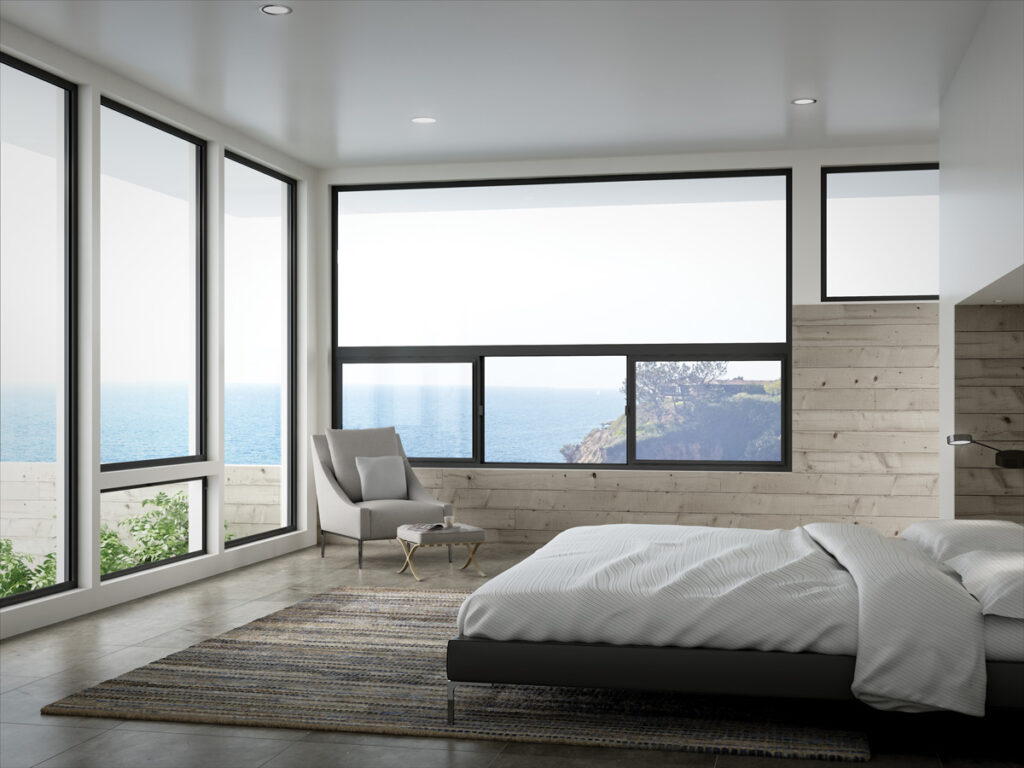An R-value, or resistance value, is a term used to describe the insulating power of different parts of a home or building. R-values are frequently referenced when comparing different insulation materials, but they apply to any material, barrier, or part of the home where heat flows in or out, including walls, ceilings, and windows. Understanding the R-value of windows can help you make a more informed decision when considering installing or replacing your existing windows.
R-Value of Windows: Basics for Buyers
Understanding the R-value of windows isn’t as complex as it seems at first glance. Essentially, a window’s R-value measures its thermal resistance and insulating properties, which is a good way to assess its effectiveness. Windows with higher R-values provide better heat resistance and reduce the amount of heat transfer between outdoors and in.
R-Value vs. U-Factor
You may see a window’s R-value discussed alongside its U-factor. R-values and U-factors are both related to a window’s energy performance and efficiency, but the terms are not interchangeable.
While a window’s R-value measures its thermal resistance, a window’s U-factor measures how quickly it transmits non-solar heat flow. For homeowners, the primary thing to remember is that U-factors and R-values are the inverse of each other. The lower a window’s U-factor, the better its energy efficiency. The higher the R-value, the better the efficiency.
What Affects a Window’s R-Value?
Several factors influence a window’s R-value, including all the following:
Window Type
Deciding between single-pane, double-pane, or triple-pane windows isn’t just a matter of stylistic taste and budget. Different styles of windows have different insulation properties. As a rule of thumb, the more layers of glass between the panes, the higher the insulating power will be. In other words, more panes equals better insulation, which equals a higher R-value.
Gas Fills
The R-value in double-pane or triple-pane windows can be further improved with argon or krypton gas fills. A “gas-filled” double or triple-pane window is one where argon or krypton fills the spaces between panes instead of air. Argon and krypton are safe, non-toxic gases with excellent insulating power that can significantly improve a window’s R-value.
Window Frame
The material used to frame your window also affects its R-value. Vinyl, fiberglass, and wood frames have higher R-values, while aluminum frames, which conduct heat more easily, have lower R-values. You can improve your window frame’s R-value with tight installation, caulking, weather-stripping, and other supplementary strategies. Aluminum frames, for example, will be more energy efficient if they’re installed with a thermal break (an insulating plastic strip).
Window Coatings
Low-emissivity, or low-E coatings, are thin and virtually invisible coatings that can significantly improve a window’s insulating power. Windows that have a low-E coating applied can see energy loss reduced by between 30 and 50 percent. Low-E window coatings have multiple benefits, including improving a window’s R-value, helping to reflect infrared light, and reducing heat transfer.
Window Treatments
Window treatments can also influence a window’s R-value. Conventional or unsealed draperies are not particularly effective at insulating windows because air can flow around them to and from the glass. To increase energy efficiency, window treatments should be tightly fitted along the edges. Roller shades, Roman shades, or insulating shutters all have higher R-values than traditional draperies or Venetian blinds.
Installation and Placement
A high-quality, energy-efficient window is only as effective as its installation. Windows that aren’t properly installed can result in drafts, condensation, and higher energy bills. Whether replacing old windows or installing brand-new ones, hire a professional to do the job. Windows are a hefty financial investment, and proper professional installation is the best way to ensure that your windows are fitted for peak performance. (Don’t forget that improper installation can sometimes even void your window’s warranty.)
_____
When you’re in the market for new windows, American Window Company can assist you in locating your perfect window. Whether you’re wondering about R-values and U-factors or debating the merits of vinyl vs. aluminum, our team of experts is happy to answer your questions. With our extensive selection of windows from trusted manufacturers, we’re sure to have the ideal window for your needs. Contact us today to discuss your project.




